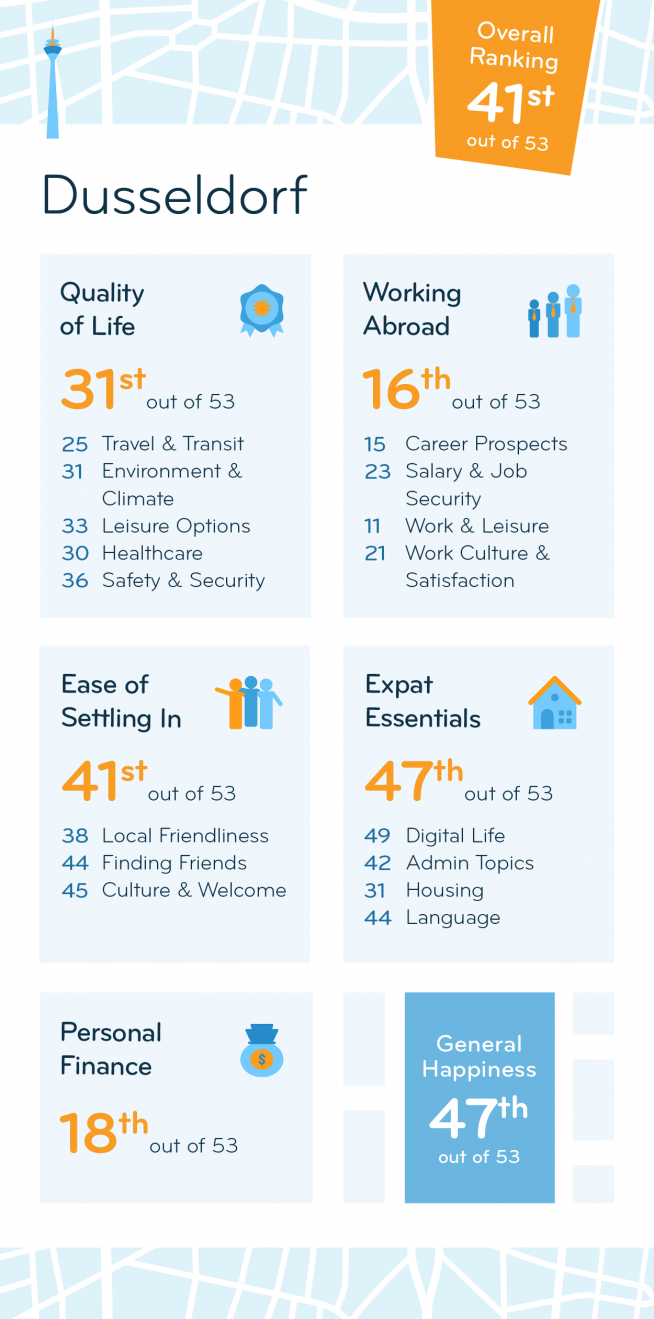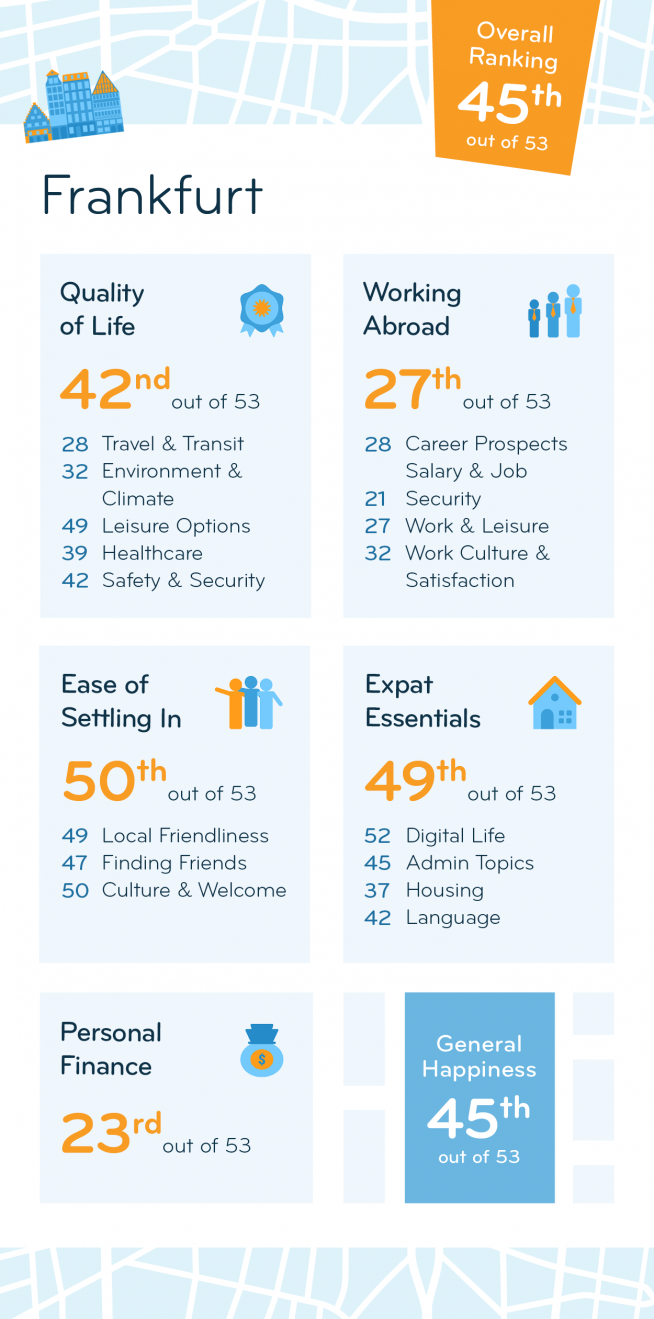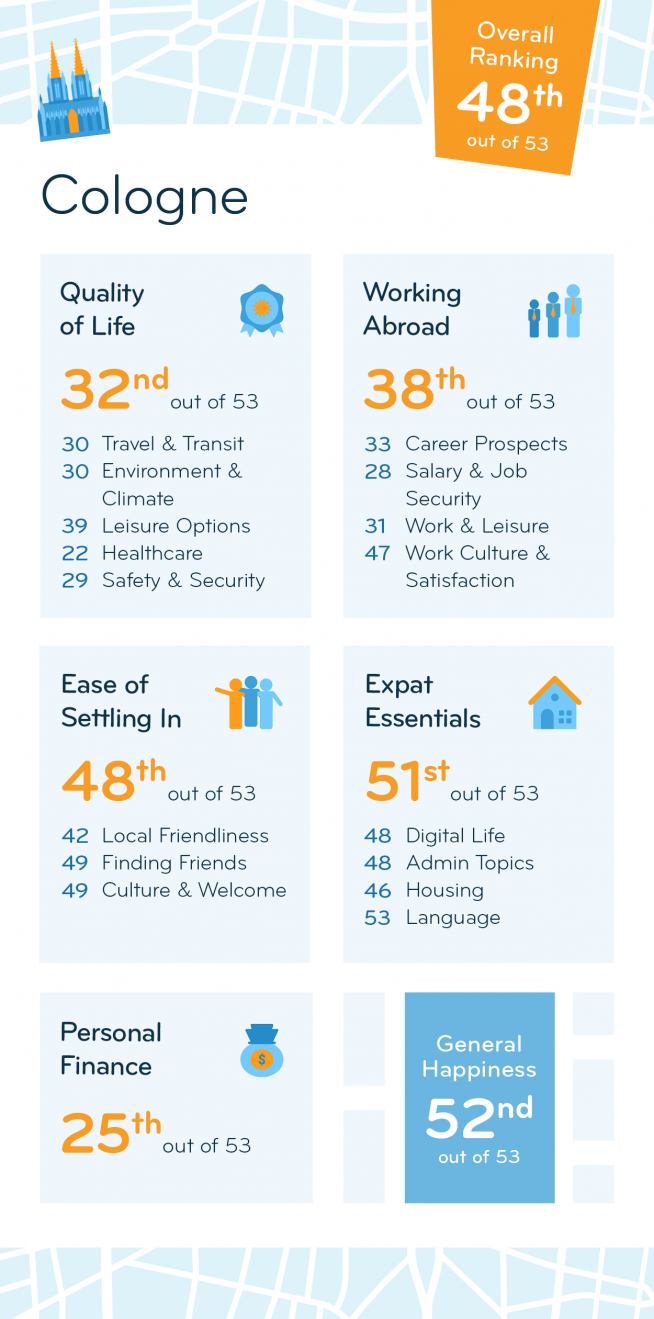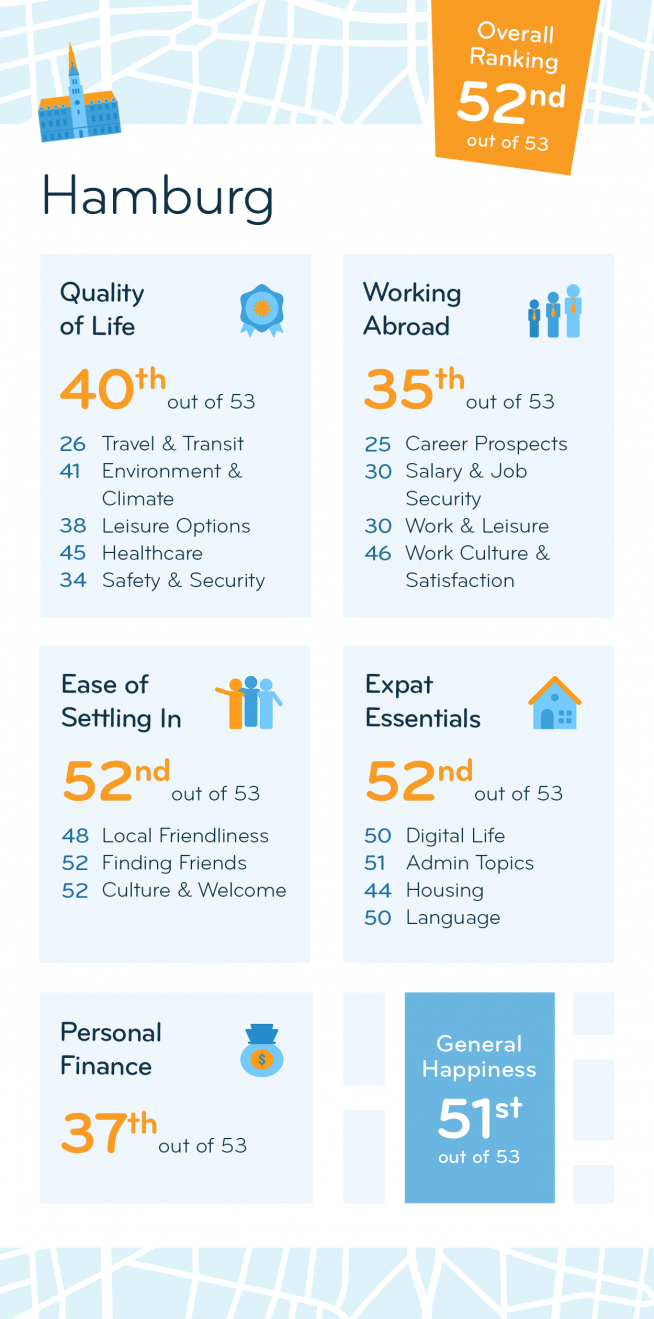How Expats Rate Life in Six German Cities
- Be Prepared for Paperwork (Emphasis on Paper)
- A Mixed Picture for Finances
- Work Not What It Used to Be
- Green but not Great
- Not Easy to Settle In & Find Friends
- 41 | Dusseldorf
- 45 | Frankfurt
- 46 | Berlin
- 48 | Cologne
- 50 | Munich
- 52 | Hamburg
- Further Reading
- External References
Out of a total of 53 cities worldwide, six German cities make it into the 2024 Expat City Ranking — and expats aren’t happy in any one of them. Only Dusseldorf (41st) manages to escape the bottom 10 of the ranking, while Frankfurt (45th), Berlin (46th), Cologne (48th), Munich (50th), and Hamburg (52nd) very much disappoint.
Be Prepared for Paperwork (Emphasis on Paper)
From Cologne’s 48th place to Berlin’s 53rd, the six German cities make up the worst-performing destinations when it comes to the Digital Life Subcategory. At most, 36% of respondents agree that government services are available online (vs. 58% globally). Cashless payment options are comparatively few and far between, and respondents struggle to get high-speed internet access in their new home (the six cities all rank at the bottom for these two factors).
“Paperwork often still needs to be sent by regular mail or you have to go in person to an office to figure it out. And there are often long wait times for appointments of any kind (with government agencies, doctors, etc.).” - Ukrainian expat in Berlin
Whether in person or online, it’s generally not easy to deal with the paperwork and local authorities, according to 58% or more expats in these German cities (vs. 42% negative responses globally). Berlin sees the worst results here, with close to three-quarters (74%) saying it’s difficult.
The language barrier — which more than half already dreaded before their move to Germany — makes things worse. Expats find German difficult to learn (from Dusseldorf’s 37th place to Berlin’s 47th for this factor), but local language skills are needed according to 39% or more. In Cologne, the share of respondents who disagree that it’s easy to live there without speaking German is as high as 59% (vs. 33% globally).
All in all, it’s hardly surprising that results in the overarching Expat Essentials Index are dire. With Frankfurt (49th), Munich (50th), Cologne (51st), Hamburg (52nd), and Berlin (53rd), all of the bottom 5 cities are German. And Dusseldorf’s 47th place — thanks to somewhat more affordable housing (25th) — isn’t that much better.
A Mixed Picture for Finances
Speaking of affordability: this is one area where the German cities vary in performance. Dusseldorf (18th), Frankfurt (23rd), Cologne (25th), and Berlin (28th) are all found in the (upper) midfield of the Personal Finance Index. Particularly, expats in Dusseldorf profit from comparatively lower costs (19th) in combination with high incomes; close to half (47%) say their yearly income is 75,000 USD or more (vs. 32% globally).
The situation is somewhat different in Hamburg (37th) and, most noticeably, Munich (48th). The Bavarian capital ranks in the bottom 10 for both the general cost of living (45th) and expats’ satisfaction with their financial situation (46th).
Work Not What It Used to Be
The Working Abroad Index used to be a highlight for German cities — in 2022, for instance, Munich (5th), Berlin (9th), and Dusseldorf (10th) all ranked in the top 10. In 2024, it’s still the area where they perform best, but results are more mediocre now. Dusseldorf’s16th place is the best rank among the six, followed by Munich (21st) and Frankfurt (27th).
Expats appreciate their job security — only Berlin (31st) doesn’t make it into the top 20 for this factor — and the working hours in these German cities. The time spent at a full-time job is indeed shorter than the global average of 42.5 hours a week, though not by much in Frankfurt (42.3 h). In Munich, it’s close to two hours less (40.6 h).
“Germany puts a lot of emphasis on work–life balance; there’s high job security and a social welfare system.” – Sierra Leonean expat in Munich
Results for the local job market are mixed. Expats in Berlin again seem to be at a disadvantage, with less than two in five respondents (38%) giving this factor a favorable rating. This is not only below the global average of 41% but also a much lower share than in Cologne (56%), Dusseldorf (56%), and Munich (60%).
Green but not Great
When it comes to the Quality of Life that expats can expect, German cities offer some highs but certainly some lows. Munich performs best in the index, ranking 21st. Berlin (29th), Dusseldorf (31st), and Cologne (32nd) are further behind, while Hamburg (40th) and Frankfurt (42nd) are close to the bottom 10.
Expats appreciate the availability of green goods and services in these cities. For example, between 74% (Frankfurt) and 85% (Cologne) say as much, compared to 64% of respondents worldwide. And at least four in five agree that the infrastructure for cars is good (vs. 73% globally).
Results are much more mediocre when it comes to expats’ feeling of safety, though. Only Munich receives a good result here, ranking 14th, while the other five place in the lower midfield. Similarly, expats are dissatisfied with their accessibility to all kinds of healthcare services and don’t really like the climate & weather. Hamburg ranks dead last for the latter.
Depending on where in Germany you live, you can at least look forward to a great urban environment (Munich 4th) and a fun culture & nightlife scene (Berlin 6th).
Not Easy to Settle In & Find Friends
“Germans are generally cold compared to the people in my home country. They are not as nice to strangers.” – South African expat in Frankfurt
Sadly, this sentiment is shared by many expats in Germany. Four out of the six German cities place in the bottom 10 of the Local Friendliness Subcategory, with Berlin even ranking last (53rd). And while Cologne (42nd) and Dusseldorf (38th) don’t share this fate, their result isn’t much better.
Expats find it difficult to make German friends — at most, a quarter agree it’s easy, compared to 38% globally — and they don’t feel welcome. Dusseldorf ranks 45th for the latter factor, while the remaining five German cities make up the bottom 5.
Consequently, Berlin (51st), Hamburg (52nd), and Munich (53rd) are the three worst-performing cities in the Ease of Settling In Index. Cologne, Frankfurt, and Berlin don’t do much better, placing 48th, 50th, and 51st, respectively. Only Dusseldorf escapes the bottom 10 of the index, ranking 41st.
41 | Dusseldorf
As the best-performing German city in 41st place, Dusseldorf at least offers some highs next to the staggering lows.
Expats appreciate the city for its job market (12nd) and the personal career opportunities it offers (14th) — even though results for the state of the economy have taken a hit (from 8th place in 2023 to 25th in 2024). Four in five respondents (80%) also praise their working hours (vs. 62% globally), making the Working Abroad Index Dusseldorf’s best-performing index (16th).
This result is closely followed by the city’s 18th place for Personal Finances. Close to two-thirds of expats (64%) are satisfied with their financial situation in Dusseldorf, 10 percentage points above the global average of 54%. It’s the most inexpensive German city in the ranking, too, placing 19th for cost of living.
Speaking of money: expats give the affordability of housing in Dusseldorf a mediocre rating in 25th place — which is still a better result than for any other German city. However, close to three in five respondents (57%) agree it can be difficult to find accommodation (vs. 34% globally). These results in the Housing Subcategory (31st) can’t protect the city from an overall bottom 10 result in the Expat Essentials Index (47th).
Similarly, Dusseldorf may not fare as badly as other German cities when it comes to the Ease of Settling In. But it still only ranks 41st in this index. For instance, only around two in five expats (41%) agree they have a personal support network in the city (vs. 55% globally).
Results are slightly better in the Quality of Life Index, where the city ranks 31st. Expats appreciate the infrastructure for cars (18th), the availability of green goods and services (14th), and also the quality (25th) and affordability (25th) of healthcare. Other factors in the index are mostly average. And respondents are nearly twice as likely as the global average to rate the weather negatively (41% vs. 21%).
45 | Frankfurt
Nearly half the respondents in 45th-ranked Frankfurt moved there for job-related reasons (49% vs. 35% globally). But was that a good call? The answer depends on what you’re looking for.
Frankfurt does offer good job security (8th), and 61% of respondents find that moving there improved their career prospects (vs. 56% globally). It’s also the German city where expats are the most likely to agree that their disposable household income is enough or more than enough to live comfortably (76% vs. 70% globally). Close to half (49%) share that their annual income is 75,000 USD or more, compared to 32% of expats worldwide.
However, these good results in the Working Abroad (27th) and Personal Finance (23rd) Indices come at a cost. As in other German cities, expats struggle to settle in, both from a practical point of view as well as a social one.
Frankfurt ranks in the bottom 10 for nearly every single factor of the Ease of Settling In Index (50th). Just two in five respondents (40%) give the general friendliness of the local population a favorable rating, for instance (vs. 63% globally).
An abysmal Digital Life — Frankfurt places second to last for this subcategory — meets struggles dealing with the local bureaucracy: 62% rate this factor negatively, 20 percentage points more than the global average of 42%. Plus, expats find housing to be neither affordable (63% negative ratings vs. 47% globally) nor easy to find (58% vs. 34%). Frankfurt’s 49th place in the Expat Essentials Index is therefore hardly surprising.
Results for Quality of Life (42nd) are more mixed. Frankfurt does okay in the Travel & Transit (28th) and Environment & Climate (32nd) Subcategories, for example. But expats are twice as likely to say they don’t feel safe (16% vs. 8% globally), and the Leisure Options (49th) the city has to offer don’t delight.
46 | Berlin
For the second year in a row, Berlin is the city where it’s the most difficult to handle Expat Essentials (53rd in 2024). The German capital ranks in the bottom 10 for each of the four underlying subcategories of this index, including a last place for Digital Life (53rd).
Over seven in ten respondents say accommodation is expensive (72% vs. 47% globally) and difficult to find (79% vs. 34%). In fact, over a third (34%) share that the housing market was among their biggest concerns prior to moving to Berlin.
Berlin also ranks 51st in the Ease of Settling In Index. It’s actually the unfriendliest city in the ranking! Around two in five expats don’t feel at home there (41% vs. 23% globally) and are unhappy with their social life (36% vs. 29%).
Luckily, there’s at least something to do and see: Berlin ranks 6th for culture & nightlife and 15th for recreational sport opportunities. Expats also rate the affordability (23rd) and availability (20th) of public transportation mostly positively, and rank the infrastructure for cars in 17th place. So why does the German capital only rank 29th overall for Quality of Life? Concerns surrounding expats’ personal safety (38th); the insufficient availability (38th) and quality (40th) of medical care; and unpleasant weather (44th) drag the index down.
In 2022, Berlin ranked 9th out of 50 cities when it comes to Working Abroad. Since then, it’s been on a downward trend and only makes 32nd place in 2024. Expats still enjoy their working hours (17th) but perceive the job market much more negatively than two years ago (34th vs. 11th). Respondents are less happy about their job security (31st), too — especially when compared to the other German cities, which rank from 4th (Dusseldorf) to 19th place (Cologne) here.
48 | Cologne
Cologne’s return to the ranking — there weren’t enough respondents for it to qualify in recent years — isn’t a triumphant one: the city only places 48th overall.
Personal Finance (25th) is Cologne’s best-performing index, though close to half of respondents (49%) rate the general cost of living negatively (vs. 39% globally). And only an average share of 55% say they’re happy with their financial situation (vs. 54%).
Housing is a significant cost factor, with 78% disagreeing that accommodation in Cologne is affordable (vs. 47% globally). More than double the global average say it’s not easy to find, either (73% vs. 34%). Still, the Housing Subcategory (46th) is Cologne’s best area in the Expat Essentials Index, where it ranks 51st overall. Like other German cities, it cannot satisfy when it comes to Digital Life (48th), Admin Topics (48th), or the Language (53rd).
Results in the Ease of Settling In Index (48th) aren’t much better. Cologne places in the bottom 3 for how happy respondents are with their social life (52nd) and whether they feel at home (51st). Over three in five expats (63%) find it difficult to make local friends (vs. 41% globally).
Job satisfaction is low (45th), which is one reason for Cologne’s 38th place in the Working Abroad Index. Another is that respondents don’t love their career opportunities in the city (38th) and find that German business culture doesn’t support flexibility (41st). The good news? Three in five expats (60%) say they’re paid fairly (vs. 58% globally).
Cologne lands in 32nd place for Quality of Life. Some aspects like the affordability of healthcare (10th); the availability of green goods and services (8th); and the political stability (17th) delight. However, they can’t fully make up for a lack of public transportation options (43rd), a dissatisfying culinary variety (44th), and the weather (47th).
All in all, Cologne ranks second to last for expats’ happiness (52nd), with less than half (46%) saying they’re generally satisfied (vs. 68% globally).
50 | Munich
The Bavarian capital lost significantly in the Expat City Ranking, falling from 38th place to rank 50th in 2024. Its results worsened across all areas of the survey, even those where Munich did traditionally well.
This includes Working Abroad: while Munich ranked 5th and 11th in the index in 2022 and 2023, respectively, it only places 21st in 2024. Expats are noticeably less satisfied with their job (from 11th to 30th) and less optimistic about the state of the economy (12th to 24th). Still, it offers high job security (7th), a good job market (8th), and pleasant working hours (13th).
Munich also ranks 21st for Quality of Life. Expats appreciate the city for its urban environment (4th), the infrastructure for cars (6th), and how safe and easy it is to get around on foot or by bicycle (13th). However, they’re noticeably less delighted with the availability of public transportation (37th) and the culinary variety & dining options (51st).
Over a third of the expats (36%) are dissatisfied with their financial situation in the Bavarian capital (vs. 26% globally), which regularly ranks among the most expensive cities in Germany.1 In fact, close to three-quarters (72%) rate the cost of living there negatively (vs. 39%). Thus, Munich only places 48th in the Personal Finance Index.
What’s more, expats find that getting settled in Munich isn’t easy, neither from a practical nor a cultural standpoint. The city comes dead last for Ease of Settling In (53rd)! Respondents perceive the local population as unfriendly towards foreign residents (53rd). They don’t feel welcome (52nd) and struggle to get used to the local culture (52nd). In fact, over half (54%) are friends with mostly just other expats (vs. 37% globally), with close to two-thirds (65%) saying that making local friends is difficult (vs. 41%).
Like many German cities, Munich performs badly for Language (46th), Admin Topics (44th), and Digital Life (51st). And that’s in addition to housing that’s both difficult to find (77% vs. 34% globally) and afford (88% vs. 47%). So, it’s hardly surprising that Munich lands in the bottom 3 of the Expat Essentials Index (50th).
52 | Hamburg
Contrary to Munich, Hamburg is no stranger to the bottom 10 of the Expat City Ranking. However, its second to last place in 2024 is a new low; only Vancouver ranks worse.
Expats in Hamburg are particularly unhappy with the Ease of Settling In (52nd) and the different aspects of the Expat Essentials Index (52nd). A lot of bureaucracy (50th), limited online services to handle administrative tasks (52nd), and a difficult housing search (50th) are just some of the sore points here.
Expats find the local language necessary to get by (48th) — but difficult to learn (45th). This might in part explain their struggles to get used to the local culture (51st), feel welcome (53rd), and make local friends (50th). Though it should be noted that nine in ten (90%) speak at least a little German.
Working Abroad in Hamburg is a bit of a mixed bag, with the city ranking 35th in the index. Close to seven in ten respondents (69%) find that moving to the city has improved their career prospects (vs. 56% globally), and more than half (53%) give the local job market good grades (vs. 41%). However, that doesn’t automatically mean they’re happy at work — Hamburg ranks 48th for job satisfaction!
Results in the Quality of Life Index, where Hamburg ranks 40th, are similarly mixed. The biggest downside is the climate & weather, with the city placing dead last for this point (53rd). And expats are rather unhappy with the availability (45th) and equal access to all kinds of healthcare services (47th) in the city.
On the other hand, public transportation is both available (19th) and comparatively affordable (25th). And 86% of respondents agree it’s easy and safe to get around on foot or by bicycle (vs. 76%). The culinary variety could be better, though (43rd).
Hamburg is the second-worst performing city in Germany when it comes to the Personal Finance Index, though its 37th place is still a noticeable step up from Munich’s 48th. Only an average share of expats (54%) are satisfied with their financial situation (vs. 54% globally). And close to three in five (58%) rate living costs negatively (vs. 39%).
When all’s said and done, Hamburg lands in the bottom 3 for expats’ general level of happiness (51st).
Further Reading
- Discover the Best & Worst Cities for Expats in 2024
- The Best & Worst Cities to Get Started Abroad
- Discover the Top Cities to Feel at Home Abroad in 2024
- The Best (& Worst) Cities for Finances in 2024
- Expat Insider 2024 | Germany Unwrapped: Expats Give the Worst Rating Yet
- Expat Insider 2023 | Berlin: The German Capital Offers Expats a Rocky Start
- Expat Insider 2023 | Frankfurt: Great Career Options, but a Sense of Home Is Missing
- Expat Insider 2023 | Hamburg: Where Expats Are Unhappiest with Their Social Life
- Expat Insider 2023 | Munich: A Great Quality of Life, but It Takes a While to Adjust
- Expats in Berlin
- Expats in Cologne
- Expats in Dusseldorf
- Expats in Frankfurt
- Expats in Hamburg
- Expats in Munich








